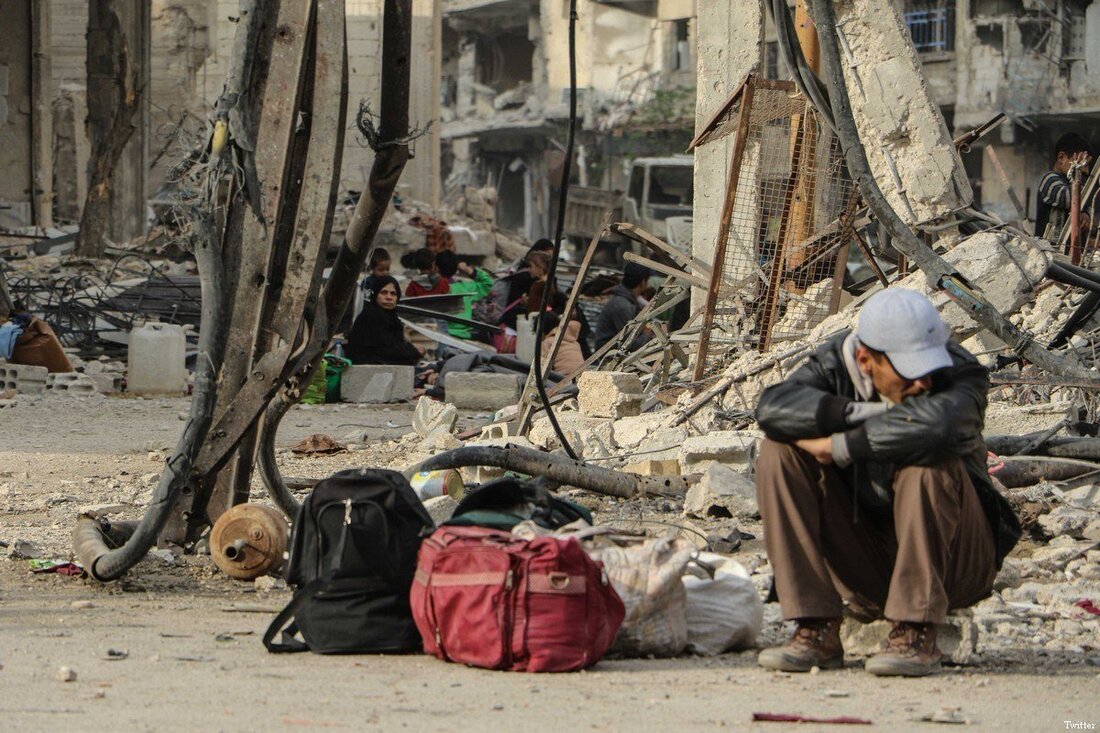 Syrian civilians caught in the middle of conflict Purpose behind trials and difficulties Allah ﷻ says that He created this life for nothing but a test and trial for humankind: “[He] who created death and life to test you [as to] which of you is best in deed - and He is the Exalted in Might, the Forgiving.”[1] The earth with its major and minor sufferings, difficulties and problems is what makes it a perfect testing ground. Had it been a complete peaceful place it would not have fulfilled the purpose of our existence on earth. These difficulties, trials and tribulations more or less that each human experiences are supposed to make them strong and near perfection as long as they exercise patience when facing them and remain content with Allah’s will. Allah ﷻ asks the believers: “Do people think that they will be let go merely by saying: “We believe,” and that they will not be tested?”[2] In this rhetorical question, Allah ﷻ uses the Arabic term fitnah which is translated as ‘test’. As per Lanes dictionary fitnah means: “the melting of gold and of silver in order to separate, or distinguish, the bad from the good.”[3] The example of trials is like the touchstone, and the example of humans that of a gold rock with all its impurities. What does a touchstone do when a goldsmith keeps rubbing it to remove the impurities? It gradually brings out its shine! The purpose of such trials and tests is to purify one and make them polished internally. This internal polish increases our knowledge of Allah ﷻ and assists us to gain spiritual closeness, which helps us to better understand Him and His purpose for our lives. In Islam, the greatest in the sight of Allah ﷻ are the Prophets among humankind that is due to the suffering they bear and patience they display at them. Since they bear the most suffering their status near Allah ﷻ in this world and the hereafter are much greater. After the prophets everyone else is tested according to the level of their faith. A narration of Prophet Muhammad ﷺ explains this: Musab bin Saad (radiAllahu anhu) narrated from his father that a man said: “O Messenger of Allah ﷺ which of the people is tried most severely?” He said: “The Prophets, then those nearest to them, then those nearest to them. A man is tried according to his religion; if he is firm in his religion, then his trials are more severe, and if he is frail in his religion, then he is tried according to the strength of his religion. The servant shall continue to be tried until he is left walking upon the earth without any sins.”[4] Suffering due to calamities, trials etc. whether it befalls the Prophets or any other among the believers, helps them gain higher ranks and proximity to Allah ﷻ in this life and the hereafter. In another prophetic narration it is said that spiritual closeness gained with Allah ﷻ becomes so dearer to some righteous among the believers that when suffering befalls them: “One of them will rejoice at calamity as one of you would rejoice at ease.”[5] A sufi (Islamic) saint was inquired about how he was patient at his suffering, to which he responded: “How can I complain when (it is said in the Quran) : “Allah is with the patient.”[6] The closer they feel to Allah ﷻ the more shining their souls become. They fulfill the purpose of a lamp in darkness. Such righteous ones become the deputies of the prophets on earth. The purpose of suffering is to bring out that shine in us as long as we bear patiently and keep remembering Allah ﷻ. However one very important fact that Quran teaches us about difficulties and trials is that: “Allah does not burden anyone more than they can bear.”[7] References: [1] Al Quran 67:02 – Asad Translation. [2] Al Quran 29:02 [3] Lane 1863 - http://lexicon.quranic-research.net (quranic-research.net) [4] Jami at-Tirmidhi 2398 [5] Sunan Ibn Majah 4024 [6] Al Quran 2:153 [7] Al Quran 2:286
0 Comments
Leave a Reply. |
AuthorZaid Shaw Archives
December 2022
Categories |
Proudly powered by Weebly
 RSS Feed
RSS Feed